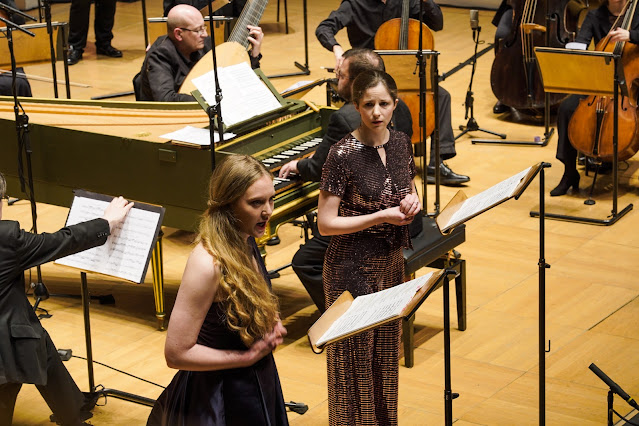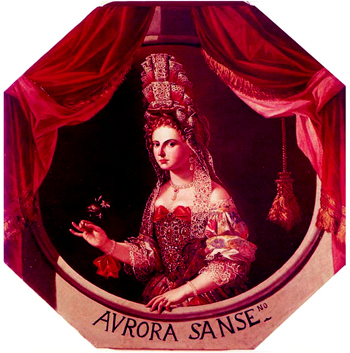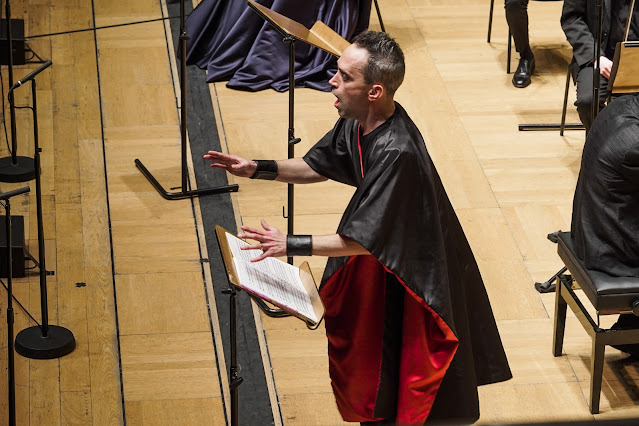 |
| Handel Aci, Galatea e Polifemo - Bethany Horak-Hallett, Zoe Brookshaw - Orchestra of the Age of Enlightenment, Steven Devine at Cadogan Hall |
Handel Aci, Galatea e Polifemo; Zoe Brookshaw, Bethany Horak-Hallett, Trevor Bowes, Orchestra of the Age of Enlightenment, Steven Devine; Cadogan Hall
Reviewed by Robert Hugill on 23 January 2022 Star rating: (★★★★)
Handel's earlier, Italian version of the Acis, Galatea and Polyphemus story in an engaging performance full of character, swagger and pathos
Handel spent most of 1708 in Rome, but during June and July of that year he made an expedition South to Naples where his serenata Aci, Galatea e Polifemo was premiered. We don't know that much about the circumstances of this first performance; the work seems to have been commissioned by Aurora Sanseverino, Duchess of Laurenzano, for the marriage of her niece to the Duke of Alvito. The Duchess was a great patron of the arts, ran a famous salon in Naples and was an author herself. The text of the serenata is by the Duchess' private secretary, Nicola Giuvo. The work is notable for the writing for the bass soloist singing Polifemo, clearly Handel had at his disposal a bass with a remarkable range. Handel would re-use material from the serenata, Polifemo's first aria pops up in Rinaldo for instance, but when he came to write Acis and Galatea for the Duke of Chandos in 1718, Handel seems to have started from scratch and written an entirely new work, though he would later create hybrid versions including one where elements of Acis and Galatea are back-translated into Italian and slipped into Aci, Galatea e Polifemo!
On Sunday 23 January 2022, there was a chance to catch a rare performance of Handel's Aci, Galatea e Polifemo when Steven Devine directed the Orchestra of the Age of Enlightenment at Cadogan Hall with soloists Zoe Brookshaw (soprano, Aci), Bethany Horak-Hallett (mezzo-soprano, Galatea), Trevor Bowes (bass, Polifemo).
 |
| Aurora Sanseverino who commissioned Handel's Aci, Galatea e Polifemo by Francesco Solimena |
It is a somewhat curious work for a wedding present, as the work ends with Aci's death (at Polifemo's hands) and Galatea's rejection of Polifemo (again), though in fact the final image of the work, narrated in accompanied recitative by Polifemo, is of Galatea (who is a sea nymph) returning to the sea to be joined by Aci who is now transformed into a river, so the two lovers are ultimately united and the work has a suitably uplifting coro (sung by all three characters):
'Who loves well has the goals of faithful love, pure steadfastness. Even if pleasures are lacking at least there is hope'.
Aci is a somewhat passive characters, but Zoe Brookshaw brought out his steadfastness, and her attractively bring soprano gave the character quite a youthful air (Handel wrote the work for a soprano hero and a mezzo-soprano heroine). Her simile aria about the eagle in part one was impressively done with great poise, partnered just by an extremely busy continuo. In part two, despite all the angst there is time for a delightful simile aria about birds, this time dueting with Katharina Spreckelsen's oboe. Finally, as Aci dies, Brookshaw was touching and intense in his last aria.
Galatea spends rather a lot of time in melancholic lamenting as she is being pressed and oppressed by Polifemo. Bethany Horak-Hallett did this magnificently, and her warm mezzo-soprano created an intensely moving atmosphere from her opening aria. This Galatea is never quite fun, but Horak-Hallett made sparks fly in her second aria, a simile aria about thunder and lightening. She had another simile aria in part one, this time the more gentle image of waves. The librettist seems to have relied rather too heavily on smile arias, but certainly Handel produced some fine music for them. In rart two, Horak-Hallett was beautifully touching in the aria where she begs to be left alone to be melancholy, and ends on a vivid note as Galatea describes returning to the sea. There is only one real love duet for the two lovers, and in fact this is a trio as the touching singing from Brookshaw and Horak-Hallett was repeatedly interrupted by Trevor Bowes' intemperate utterings as Polifemo.
Bowes made a terrific Polifemo, bringing a wonderful confidence and swagger to the the arias with a great sense of the character's self-belief. The character comes on with the aria that Handel would move into Rinaldo, with Bowes giving it real bravura swagger, but then in his second aria Bowes made Polifemo almost touching, though the deliberate unevenness in Handel's writing brings out an element of roughness too. The range of the role clearly pushed Bowes to his limits, but in his second aria in part one, which has the widest range, Bowes showed superb control and ability to sing gently despite the wide leaps, whilst the combination of low bass voice with high recorder was very striking.
 |
| Handel Aci, Galatea e Polifemo - Trevor Bowes - Orchestra of the Age of Enlightenment at Cadogan Hall |
Throughout, the recitative was vividly done and all three singers gave a terrific attention to the words. Steven Devine directed from the harpsichord, and the orchestra gave us the first movement of Handel's Concerto Grosso Op.6 No. 10 as overture. Throughout there was plenty of fine playing and lots of character and atmosphere, and plenty of solo moments for individual players.
Acis and Galatea gets regular outings so it was lovely to be able to experience Handel's very different thoughts from his earlier serenata.
Never miss out on future posts by following us
The blog is free, but I'd be delighted if you were to show your appreciation by buying me a coffee.
Elsewhere on this blog
- You have two ears and an opinion: artistic director Fiachra Garvey introduces this year's Classical Vauxhall festival - interview
- Decadence and refinement: Karina Canellakis conducts Scriabin's Poem of Ecstasy with the London Philharmonic Orchestra - concert review
- Winter Opera St Louis educates as it entertains - guest posting
- Pure joy: ECHO Rising Star recorder player Lucie Horsch & lutenist Thomas Dunford in music old & new - concert review
- Beyond Miss Julie: Joseph Phibbs on his opera Juliana setting Laurie Slade's updating of Strindberg - interview
- Opera scenes from the Young Artists of the National Opera Studio with the orchestra of English National Opera at Cadogan Hall - concert review
- Beauty and bleakness: Douglas Knehans' Cloud Ossuary from Brno Philharmonic Orchestra and Mikel Toms - record review
- The Art of Transformation: inspired by a Scottish Border ballad Alastair White's Woad is very much an opera for our times - record review
- A sense of ritual: Edward Jesson's Syllable, a work of complex musical theatre, is premiered by Trinity Laban Opera - opera review
- Still in cracking form: Verdi's Nabucco returns to Covent Garden - opera review
- The sense of eternity that can be found in the simple doing of something: Sven Helbig's Skills - interview
- In stunning control of his material: Gavin Higgins' Ekstasis from Piatti Quartet, Fidelio Trio, Thomas Gould, David Cohen, Sara Roberts - record review
- Home











No comments:
Post a Comment